What You Need To Know
For the sake of this discussion, let’s categorize organic mineral depletion from soil as the result of 2 factors—natural and man-made causes.
Natural Causes

Nutrient depletion of soils and fertilizers can occur as a natural consequence of soil erosion—most nutrients are found in topsoil, which naturally erodes fastest or undergoes slow release into air.
This is not a major concern, as natural erosion and slow release transfers nutrients, elements, microbes, compost, manure, and chemical compounds to other locations—the earth doesn’t eat itself up and deplete its own resources.
Man-Made Causes
While it’s easy to think of ourselves as separate from our environment, the truth is that we are intrinsically linked to it—what we do affects the environment and vise-verse.
So, how is man naturally depleting nutrients organic to our soil?
Soil Nutrient Mining

This results in the deterioration of soil structure and the depletion of its physical, chemical, and biological properties. This typically occurs as a result of over-farming, lowering the organic matter and nutrients without properly replenishing them. This problem is more acute in areas where crops are cultivated with low doses of mineral fertilizers and little to no organic recycling.
Simply put: when healthy soil is overused, with only synthetic rather than the best organic fertilizers as means to boost plant and root growth, you end up with lower yields and less healthy soil the coming season.
Soil Pollution
The presence of man-made toxic chemicals is usually caused by improper waste disposal coming from industrial activities and sources, as well as agricultural pesticides.
Salinization
This is the process of increasing the salt content of the soil, and is usually the result of improperly maintained irrigation systems.
The Earth Summit concluded in 1992 that “There is deep concern over continuing major declines in the mineral values in farm and range soils throughout the world.” This was based on data showing a decline in nutrient levels over the last 100 years:
Europe – 72% decline
Asia – 76% decline
North America – 85% decline
The soil structure itself and the fertilizers therein are crucial to the health and growth of plants and, as such, are just as crucial to our health as well.
Organic fertilizer like Liquid TNT gives more nutrients to the soil, which is taken in by plant roots and makes them more healthy. These nutrients are absorbed into the crops in your garden which eventually make it into your food.
Commercial farms typically don’t use organic fertilizer, instead planting in depleted soil and using non organic fertilizers like NPK on their crops.
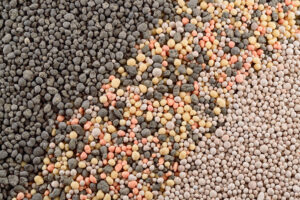
NPK stands for Nitrogen, Phosphorus, Potassium. While these are beneficial fro plants, they are just a few of the many nutrients plants need for healthy growth and the NPK ratio is usually way too high.
NPK is just the bare minimum that keeps plants alive. Plants also need dozens of organic minerals that have been depleted due to centuries of over-farming. Organic fertilizer like Liquid TNT contains these organic minerals, the plant food that your crops need.
These organic minerals Liquid TNT contains are what should be found in organic soil and the natural fertilizers it contains, minerals that gardeners should be using in their garden or what large-scale farmers should be using during the growing season. As organic fertilizer, it contains everything a plant needs to reach its fullest nutrient potential and thus pass on these nutrients to the human or animal that consumes it.
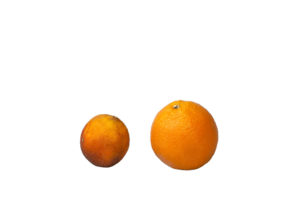 If you’re a gardener, you’re aware of the greater potential for plant health in your own garden as opposed to those purchased at the store, especially if you’re conscious enough to use the best organic fertilizers on your plants. You’re aware of the synthetic fertilizers and high NPK ratio used in mass plant production. You know a plant needs more than NPK and a pretty texture.
If you’re a gardener, you’re aware of the greater potential for plant health in your own garden as opposed to those purchased at the store, especially if you’re conscious enough to use the best organic fertilizers on your plants. You’re aware of the synthetic fertilizers and high NPK ratio used in mass plant production. You know a plant needs more than NPK and a pretty texture.
Gardening is an enriching experience and nothing tastes quite as good as a meal made with ingredients that you’ve grown and cultivated yourself in your own garden.
That said, it’s important to remember that even with a lot of the organic fertilizers on the market, you likely aren’t getting all of the essential nutrients that you’d find in truly organic soil.
In fact, mere decades ago, the plants we consumed were far more rich in vitamins and minerals organic to the do to the minerals found in natural soil and fertilizers.
Soil depletion is the main culprit here, with large scale gardening for mass produce using only NPK and synthetic fertilizers rather than organic fertilizers. This, along with modern intensive agricultural methods, have depleted organic nutrients from the soil—nutrients that plants need in order to reach their full nutritional potential.
As this trend of intensive over-farming and use of non organic fertilizers continues, each new generation of plants is less nutritious, as it has received less plant food found in organic fertilizers and more NPK and pesticides.
Studies Show That a High NPK Ratio To Farm Land Isn’t Enough to Make Up for Intensive Over-Farming.
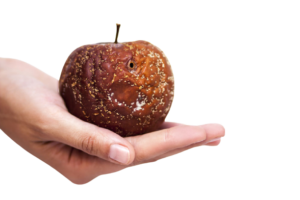
Donald Davis and researches from the University of Texas at Austin’s Department of Chemistry and Biochemistry published a study in December 2004. This study appeared in the Journal of the American College of Nutrition, which went off data from US Department of Agricultural from the years 1950 to 1999. With 43 different fruits and vegetables included in this study, what they found was very eye opening—reliable declines in:
- Protein
- Calcium
- Phosphorus
- Iron
- Riboflavin (vitamin B2)
- Vitamin C
Their conclusion: This reliable nutritional decline is the result of agricultural practices that are designed to improve traits such as growth rate, pest resistance, and size, rather than actual nutrition.
“Efforts to breed new varieties of crops that provide greater yield, pest resistance and climate adaptability have allowed crops to grow bigger and more rapidly,” reported Davis, “but their ability to manufacture or uptake nutrients has not kept pace with their rapid growth.”
 The typical meal today does not contain all of the organic minerals your body needs. As our soil has lost its organic nutrient content, so has our food.
The typical meal today does not contain all of the organic minerals your body needs. As our soil has lost its organic nutrient content, so has our food.
We should be getting a lot of beneficial minerals from plants, minerals that we need to ward off sickness and disease—be it the proper functioning of the brain and all other organs, proper lymphatic function, or the beneficial antioxidants we need to fight off cancer-causing free radicals, these things are essential to our health and well-being.
All of this is to say that even if you stick to a healthy meal plan—a difficult task, especially in the US—you are likely still not getting the organic minerals you need, as the fruits and vegetables you get from main markets are not grown through organic gardening (even if the label claims such). Garden soil used to mass produce plants that we feed on are typically lacking the organic minerals we need—instead, these plants are created for preservation, travel, and color, rather than adequate nutrient quality.
Quality Food is the Foundation of Physical Health
And the foundation of quality food is vital soil that contains the organic minerals required to produce it.
According to Dr. Linus Pauling: “You can trace every sickness, every disease and every ailment to a mineral deficiency.” More and more research is backing Dr. Linus’ assertion, as links have been found between organic mineral depletion in soil with ailments such as:
- Multiple sclerosis,
- High cholesterol,
- Fibrocystic breast disease,
- Anemia,
- Osteoporosis,
- Chronic fatigue syndrome,
- Goiter,
- Nervous disorders,
- Arthritis,
- Diabetes,
- Cancer,
- Parkinson’s disease,
- Lou Gehrig’s disease,
- Bladder & kidney disease,
- Celiac disease,
- Dysbiosis,
- IBS,
- Crohn’s disease,
- Allergies,
- Prostate disease,
- Dizziness,
- Heat stress ulcers,
- And even the common cold.
 While most organic farms do their best to boost their garden soil with minerals that eventually make it into the plant roots, large scale garden soil does not contain the percent of organic fertilizer that plants need to feed on. Much of what is marketed as “organic” is to a large degree synthetic.
While most organic farms do their best to boost their garden soil with minerals that eventually make it into the plant roots, large scale garden soil does not contain the percent of organic fertilizer that plants need to feed on. Much of what is marketed as “organic” is to a large degree synthetic.
Gardeners would benefit most from using their own organic fertilizer in their garden to make their soil as rich as possible, guaranteeing a meal that contains all of the elements needed for a healthy diet.
Gardeners know that organic gardening is difficult, but with Liquid TNT it doesn’t have to be, nor is the process slow when you feed our organic fertilizer to your plants or even directly into the soil during the growing season.
Liquid TNT contains all of the organic minerals your garden needs—that, combined with an adequate percent of microbes in your garden compost and manure, will ensure your plants get the most from your gardening efforts.
The minerals in our organic fertilizer are food for both plants and microbes.
The microbes that live in your planting soil are also beneficial for plants, so not only does this boost the vitality of your garden soil, manure, and other organic matter, it also boosts the health of the microbes that your plants also need to stay healthy, turning your planting soil into a super-powered production center that will release the most growth potential for your plants.
Organic Gardening Simply Isn’t Complete Without It
Liquid TNT is an organic fertilizer containing food for both plants and the microbes necessary for organic gardening—once your soil is enriched with these organic fertilizer minerals, it will become more vital, passing its life-giving energy into the plants and eventually into your meal.
 In nature, plants take in nutrients from soil, compost, and fertilizer organic to their surroundings. They do this primarily through their roots, but also through their pores (taking in elements from the air as well as sunlight). Flowers, trees, and even the grass on your lawn does this in a slow effort to remain alive and to grow.
In nature, plants take in nutrients from soil, compost, and fertilizer organic to their surroundings. They do this primarily through their roots, but also through their pores (taking in elements from the air as well as sunlight). Flowers, trees, and even the grass on your lawn does this in a slow effort to remain alive and to grow.
Organic fertilizers like Liquid TNT allow a plant to take in the trace minerals it needs to contain in its blood—these minerals can be absorbed by the plant root or via plant spores as well.
Unlike other organic fertilizers, Liquid TNT uses a patented two-stage process to create the final product.
First, we start with the:
Dry Stage
The trace minerals that have been lost through decades of intensive over-farming are blended in a vortex chamber using compressed air and resonating frequencies for pulverization. This reduces the minerals to a micron-sized dry powder.
Second, we enter the:
Wet Stage
The micronized minerals are sent through a liquid mixing process that nano-sizes them, leaving a water solution that has been activated with nano-sized minerals—a solution that can be mixed with water and applied directly to the soil or directly to the plants as a foliar spray. Because of their nano-size, they can be immediately absorbed by a plant via the root or the plant spores.

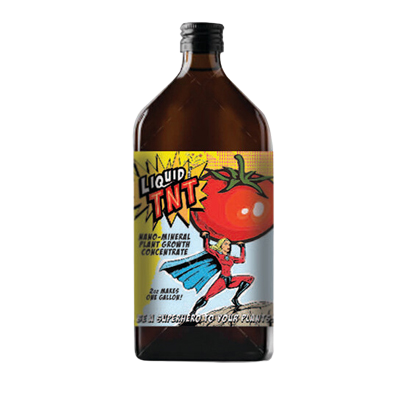
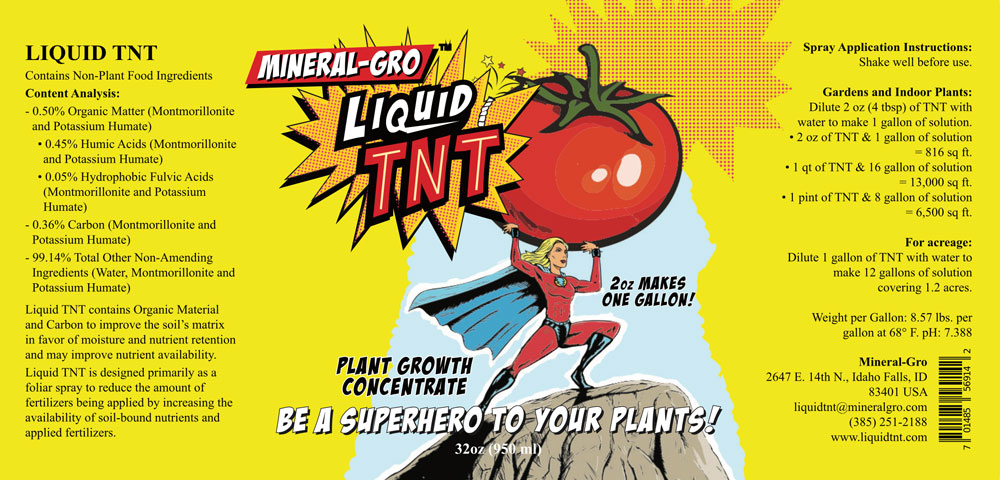
 We are losing the organic minerals in our soil that plants rely on for healthy growth. Nutrient scarcity in our soil is becoming more and more of a problem, and it may become a worldwide problem sooner than we think. This will have devastating impacts on both crop yields and public health.
We are losing the organic minerals in our soil that plants rely on for healthy growth. Nutrient scarcity in our soil is becoming more and more of a problem, and it may become a worldwide problem sooner than we think. This will have devastating impacts on both crop yields and public health.